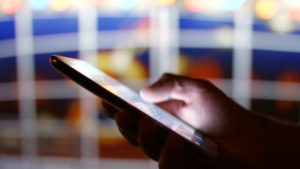The Pew Research Center reports that 15% of American adults have used some form of online dating, a number that has steadily increased since the dawn of Match.com in 1995. The stereotypes surrounding these users – basement-dwelling, overweight, awkward – whether you agree with them or not, exist.
What losers, says the twenty-something. How desperate can these people be that they exaggerate their accomplishments and looks then sit behind a screen waiting for validation? Can’t they just find companionship like normal people?
For many young people, it seems taboo for such behavior in regards to romantic relationships. But when it comes to the same behavior for social relationships, validation from behind the screen becomes the norm and is even admired.
“[Millennials] are growing up in a Facebook-Instagram world; in other words, we’re good at putting filters on things,” says author and consultant Simon Sinek. “We’re good at showing people that ‘life is amazing even though I’m depressed.’”
I’m not here to take a stance on Internet dating or social media. But I am here to lay out the similarities of both so you can decide for yourself which one is more shallow. As I was researching for this article, I noticed that each similarity between social media and online dating fell into two categories, the first of which is the urge for dopamine.
 Engagement with social media releases the reward-chemical dopamine – this is why getting notifications feels good. It’s why we count our “likes” and log onto social media apps when we’re bored, lonely, anxious, or depressed. When people acknowledge us, however superficial that acknowledgement is, it feels good. When someone posts “Happy birthday!” on Facebook or retweets us, a signal is sent to our brain telling us we’re relevant and desired. And the more of it we get, the more dependent the brain becomes dependent on apps for temporary relief. Soon enough it becomes an addiction.
Engagement with social media releases the reward-chemical dopamine – this is why getting notifications feels good. It’s why we count our “likes” and log onto social media apps when we’re bored, lonely, anxious, or depressed. When people acknowledge us, however superficial that acknowledgement is, it feels good. When someone posts “Happy birthday!” on Facebook or retweets us, a signal is sent to our brain telling us we’re relevant and desired. And the more of it we get, the more dependent the brain becomes dependent on apps for temporary relief. Soon enough it becomes an addiction.
“If you’re sitting at dinner with your friends and you’re texting somebody who’s not there, that’s an addiction,” says Sinek. “It sends a subconscious message that ‘you’re not that important.’ If you wake up and check your phone before you say good morning to your boyfriend, girlfriend, or spouse, you have an addiction.”
This same chemical dependency occurs with online dating. When a user is matched with someone on a dating site, he or she gets a rush of dopamine to the brain, a feeling which is most useful within the same emotional states that we log onto social media: bored, lonely, anxious, or depressed. We run into a problem, though, when we believe this is the best way to fulfill ourselves.
Whether a hit of dopamine comes from social media or eHarmony makes no difference to the human brain. But in our culture it’s the difference between being cool and potentially getting labeled as a social outcast.
The remaining similarities fell into a category that’s best described as the pursuit of perfection. We’re quick to share our ideal selves on social media: our proudest achievements, our daily highlights, our perfect relationships. We have external apps to enhance our best pictures, because Instagram’s built-in filters don’t make us look “good enough.”
Yet we wouldn’t dare tweet our failures, Instagram our dissatisfaction, and Snapchat our imperfections. Scrolling through this infinite buffet of people’s curated lives creates the illusion that what we see is all there is, when in fact we’re blind to the 99.9% of their lives that are conveniently edited out.
Sites like eHarmony and Match.com function along these same exact premises.
“Online dating promises to open up something absolutely wonderful,” says modern-day philosopher and author Alain de Botton. “It encourages the idea that good relationships are conflict-free…and that any conflict or imperfection is wrong.”
Our fear of rejection prompts us to hide any traces of weakness and vulnerability. But ironically, confronting those exact feelings often leads to more genuine romantic and social relationships. The idea that technology can make human relationships easier is seductive. It eliminates the need for patience, we can connect and disconnect at our convenience, and we can save ourselves the awkwardness of unplanned interactions. But it may be possible that our technology has outpaced the evolution of our brains.
“Where is the app that will teach us how to read human behavior?” asks de Botton.
It’s unclear whether that task will ever become easier, but for now it’s safe to say neither Instagram nor Match.com is the solution.
Dominic Vaiana studies writing and media strategy at Xavier University. His personal articles, essays, interviews, and book recommendations are sent in his monthly newsletter.
